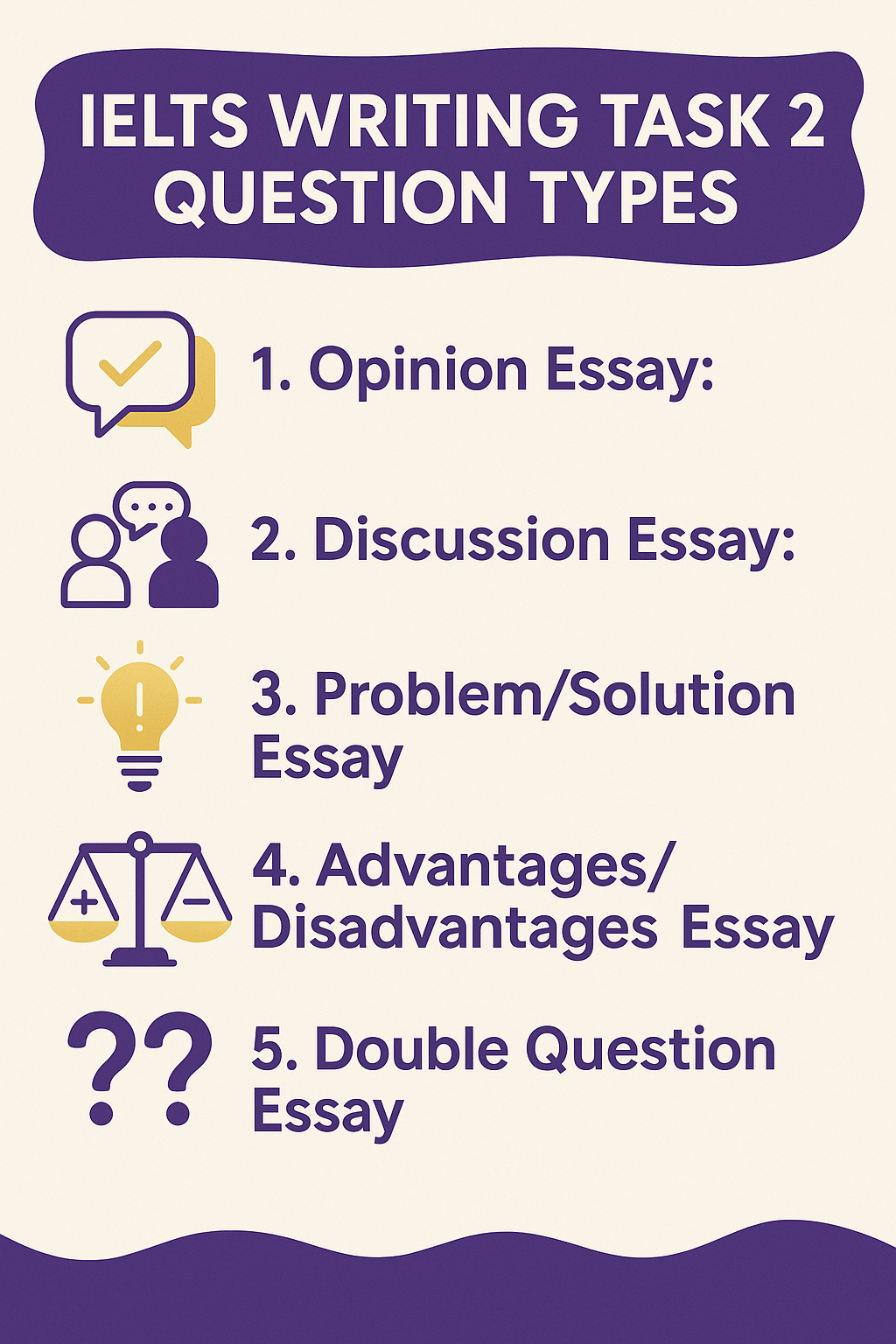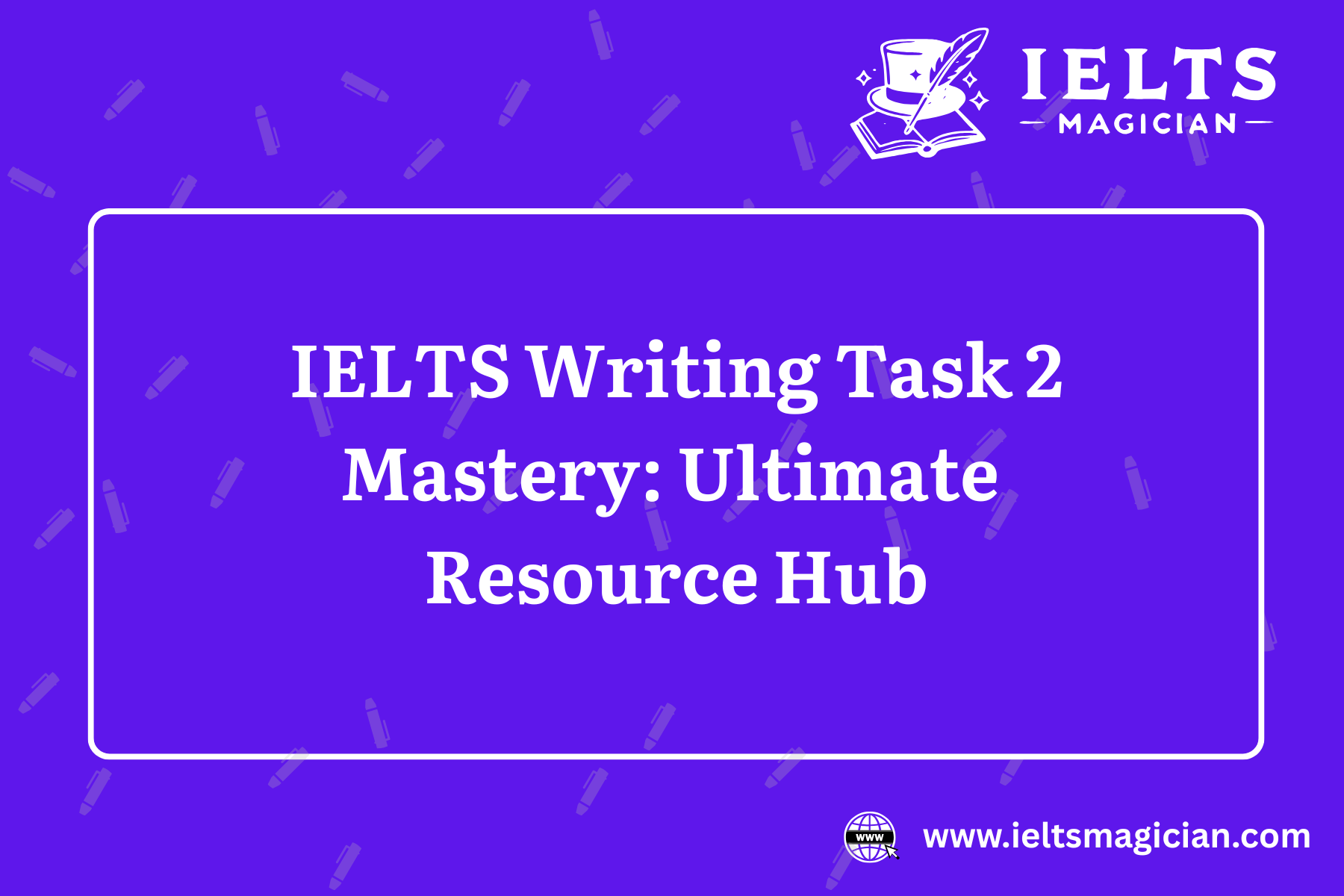IELTS Writing Task 2 requires you to demonstrate a range of essential writing skills. It evaluates your ability to present a clear, structured argument in response to a question.
You’ll learn the key strategies for improving your score and understanding the evaluation criteria.
What is IELTS Writing Task 2?
IELTS Writing Task 2 evaluates your ability to present a well-structured, coherent, and relevant argument in response to a question. It tests your writing skills, including grammar, vocabulary, and the ability to organize your thoughts clearly and logically.
A strong band score requires not only proper language usage but also effective time management and the ability to meet the task’s specific requirements.
What Are the Key Criteria for Evaluating IELTS Writing Task 2?
IELTS Writing Task 2 is assessed based on several criteria:
- Task Response: Does your essay fully address the question? Ensure you fully answer the question by presenting a clear opinion or argument. Stay relevant and address every part of the prompt.
- Coherence and Cohesion: Is your argument well-organized, and do ideas flow logically? Organize your essay logically, using appropriate linking words to ensure a smooth flow of ideas.
- Lexical Resource (Vocabulary): Are your word choices varied, precise, and appropriate for an academic essay? Demonstrate your range of vocabulary.
- Grammatical Range and Accuracy: Is your grammar correct and varied? Use a variety of sentence structures. Avoid grammatical mistakes.
Each of these criteria plays a significant role in determining your band score. A well-structured essay with logical reasoning and clear development of ideas will score highly in all areas.
What Is the Expected Word Count for IELTS Writing Task 2?
IELTS Writing Task 2 requires you to write at least 250 words. Aim for a word count between 250-280 words to avoid writing too much or too little.
Staying within this range ensures that your essay is detailed and well-rounded without overwhelming the reader.
How Do I Demonstrate Coherence and Cohesion in IELTS Writing Task 2?
- Coherence: Ensure your essay progresses logically, with each idea building on the previous one.
- Cohesion: Use appropriate linking words (e.g., “for example,” “in contrast,” “consequently”) to connect your ideas smoothly.
By maintaining coherence and cohesion, your essay will flow naturally and be easier for the examiner to read.
What Vocabulary Should I Use in IELTS Writing Task 2?
Use a range of formal, academic vocabulary to showcase your language proficiency. Avoid overly casual or informal language. Also, vary your sentence structures to demonstrate your grammatical range. Strong vocabulary includes:
- Complex terms: “eradicate,” “sustainability,” “mitigate.”
- Linking words: “in addition,” “on the other hand,” “therefore.”
- Precise expressions: “highly significant,” “widely accepted,” “unequivocally.”
Incorporating these will help you score higher on Lexical Resource.
What Are the Types of Essays in IELTS Writing Task 2?
IELTS Writing Task 2 can involve different essay types, including:
- Opinion Essays: Argue whether you agree or disagree with a statement and justify your opinion.
- Discussion Essays: Discuss both sides of an issue and provide your own view.
- Problem-Solution Essays: Identify problems and suggest solutions.
- Advantage-Disadvantage Essays: Discuss the pros and cons of a particular issue.
- Double Question Essay: Two questions are being asked related to the one particular situation or a task.
Understanding the type of essay will help you decide how to organize your response effectively.

How Should I Structure My IELTS Writing Task 2 Essay?
A clear and logical structure is critical in IELTS Writing Task 2. Here’s how you can organize your essay:
- Introduction:
- Present the topic.
- Paraphrase the question.
- State your opinion or outline the structure of your response.
- Body Paragraphs:
- First Paragraph: Present your first argument with supporting evidence and examples.
- Second Paragraph: Present your second argument with supporting evidence and examples.
- Ensure each paragraph is linked logically to the next.
- Conclusion:
- Summarize your key points.
- Restate your opinion or summarize the key arguments presented in your essay.
Ensure that your essay is well-organized, and that your argument is coherent and relevant to the question.
How Can I Organize My Ideas Effectively in IELTS Writing Task 2?
Effective organization of ideas in IELTS Writing Task 2 helps create a logical and coherent argument. Follow these tips:
- Use clear topic sentences at the beginning of each paragraph to introduce the main idea.
- Develop ideas by explaining, analyzing, and providing evidence.
- Use linking words and transitions to maintain cohesion across paragraphs.
- Ensure your ideas are relevant and well-supported.
By following these steps, you will present your ideas in an organized, structured, and clear manner, making it easier for the examiner to evaluate your writing.
How Can I Support My Arguments in IELTS Writing Task 2?
To strengthen your argument, you need to provide convincing evidence and examples that justify your points. Effective support can include:
- Statistical data or studies (if relevant).
- Personal experiences or examples from real-world situations.
- Logical reasoning to explain the cause and effect of an issue.
A well-supported argument demonstrates your ability to analyze and explain complex ideas clearly and precisely, which is essential for achieving a high band score.
What Common Mistakes Should I Avoid in IELTS Writing Task 2?
To avoid common mistakes, keep these strategies in mind:
- Avoid task misinterpretation: Ensure that you fully understand the question and address all aspects.
- Lack of Structure: Avoid writing without a clear introduction, body, and conclusion. Structure your essay logically to make your ideas easier to follow.
- Weak Arguments: Your argument must be clear, detailed, and relevant. Avoid vague or unsupported opinions.
- Time Mismanagement: Spending too much time on one part of the essay may prevent you from completing the task. Manage your time efficiently.
- Do not overcomplicate your language: While advanced vocabulary and grammar are important, clarity should be your priority.
- Stay within the word count: Task 2 requires at least 250 words. Writing too little or too much may affect your score.
- Ensure grammatical accuracy: Incorrect grammar or punctuation can lower your score in the Grammatical Range and Accuracy criterion.
By avoiding these mistakes, you will demonstrate a higher level of proficiency in organization, grammar, and argumentation.
How Do I Improve My IELTS Writing Task 2 Score?
To improve your score in IELTS Writing Task 2, consider these tips:
- Plan before writing: Spend a few minutes outlining your essay structure and main points.
- Practice different essay types to familiarize yourself with various formats.
- Expand your vocabulary: Use a range of academic and formal words to demonstrate your lexical resource.
- Review your grammar: Ensure you use a mix of sentence structures and avoid simple errors in punctuation and syntax.
Regular practice will help you refine your writing skills, improve your grammar and vocabulary, and ensure your writing is both coherent and persuasive.
What Are Some Common Topics for IELTS Writing Task 2?
Here are a few examples of common IELTS Writing Task 2 topics:
- Education: Should universities offer free education to all students?
- Technology: Is technology making our lives better or worse?
- Environment: Should governments take responsibility for protecting the environment?
- Health: Should junk food be taxed to improve public health?
Preparing for a wide range of topics will help you feel more confident on test day.
How Can I Get Feedback on My IELTS Writing Task 2 Essays?
Feedback is crucial for improving your IELTS Writing skills. You can receive feedback by:
- Hiring a tutor: A professional tutor can provide personalized feedback on your essays.
- Using online services: There are various IELTS writing platforms where you can submit your essays for detailed feedback.
- Self-assessment: After writing, review your essay using the IELTS band descriptors to assess your performance.
How Can I Achieve a High IELTS Writing Band Score?
To score well in IELTS Writing Task 2, focus on the following:
- Understand the Criteria: Be aware of the factors that affect your score, such as coherence, cohesion, grammar, and vocabulary.
- Be Clear and Concise: Avoid over-complicating your essay. Make sure your points are easy to understand.
- Present Well-Developed Ideas: Organize your ideas logically and support them with evidence.
- Use a Range of Vocabulary: Demonstrate flexibility with vocabulary by using synonyms and precise terms.
How Much Time Should I Spend on IELTS Writing Task 2?
You should spend around 40 minutes on IELTS Writing Task 2. Divide your time as follows:
- Planning (5 minutes): Read the question, analyze the prompt, and outline your arguments.
- Writing (30 minutes): Write your essay, ensuring you follow the structure and develop your arguments.
- Reviewing (5 minutes): Check for grammar mistakes, ensure your essay is cohesive, and verify that you’ve answered the question completely.
Conclusion
Mastering IELTS Writing Task 2 requires a deep understanding of the task requirements and consistent practice. By developing strong writing skills, using an organized structure, and focusing on coherence and cohesion, students can significantly improve their performance. Regular practice, combined with feedback from teachers and peers, is the best approach to achieving a high band score.

